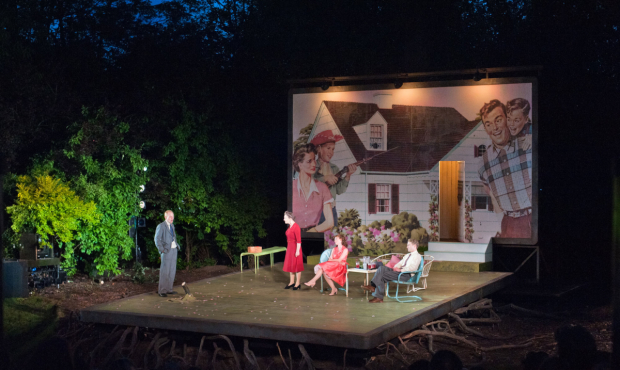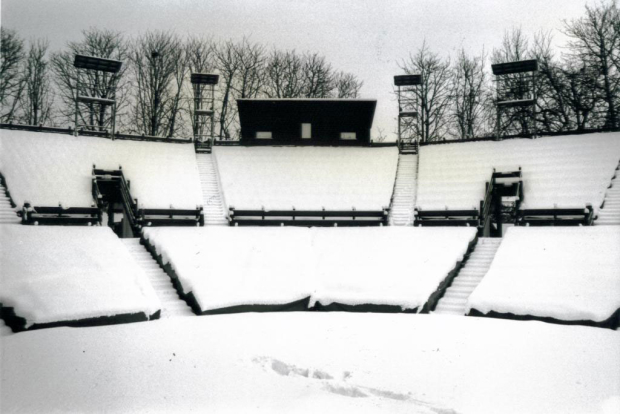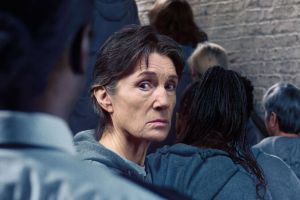Theatre making at its most challenging
Lucinda Everett goes behind the scenes at the Open Air Theatre Regent’s Park ahead of the first show of the season to discover the challenges of running a venue at the mercy of the elements
Come summertime, there are few places more appealing than Regent’s Park Open Air Theatre. The twinkling fairy-lights, the cosy picnic lawn, the huge auditorium with sets that transport us from one world to the next as the season rolls on – it’s theatre at its most magical. But, as artistic director Timothy Sheader and his team explain when I meet them in the run up to their season launch, it can also be theatre-making at its most challenging.
On a meteorologically confused April afternoon, I arrive at the theatre at the tail end of a hailstorm and am led by Company Stage Manager, Sarah Hopkins-Thomas, into the 1200-seat auditorium. In its pre-season state, the basic wooden stage is bare, and the bushes that usually hide the backstage area are sparse enough to offer tantalising glimpses.
"Over the winter, everything gets stripped out: sound, lighting, set, staging. It genuinely just looks like your garden patio!" says Hopkins-Thomas, pointing to a sliver of paving poking out from beneath the stage, which took three days to construct. Soon an 'army' of set-builders, and sound and lighting technicians will descend to ready the space for the season’s first show, an adaptation of Michael Morpurgo‘s jungle-set children’s novel, Running Wild. But it’s once the season is in full swing that the real challenge begins. "The turnaround between shows is very tight. You finish one on the Saturday and start tech for the next by Thursday," says Hopkins-Thomas. Nature also throws in its hurdles. "Bits of a bush appear that weren’t there before. Things move, the ground shifts, and if it rains a lot you get subsidence. Wood warps, floor panels might come up, and we have to do touch ups with kits that our scenic artists leave us. It’s a proper moveable feast."
"You’re never going to see a painted backdrop of New York here for a Broadway musical"
For Sheader, there are directorial challenges to overcome, not least the auditorium’s scale. "It’s big, so you’re trying to create Olivier-sized work and images but without the tricks of the Olivier. There’s no drum revolve, no flies, largely no sub-stage." Thankfully, Sheader is endlessly inventive. Since his first season in 2008, he has expanded the theatre’s repertoire to include everything from Miller and Chekhov to Broadway musicals like this season’s Jesus Christ Superstar (opening on July 15). The venue’s lack of ‘tricks’ has never held him back; when last year’s Peter Pan required the Lost Boys to go underground, Sheader simply built his own (albeit modest) substage. "They were going into a shallow space beneath the floor and then crawling through all of the scaffolding and dirt to get backstage."

© www.flickr.com/tgkw
Remembering the huge tree root that snaked across the set of 2014’s All My Sons, and the stripped wooden saloon buildings in 2011’s Crazy for You, I ask if Sheader’s visions always start with the venue’s green surroundings. "Always," he says. "But that’s not particular for me to being outside. With any job, one asks ‘what’s the environment? How do you invite it to contribute to the story? You can’t ignore it. Embrace it. It’s harder on something like a Broadway musical, but on the three that we’ve done, wood [was key]. I didn’t want anything painted. I said ‘let’s just expose the wood.’ You’re never going to see a painted backdrop of New York here for one of those musicals."
Lighting is another challenge, says Sheader. "You can’t start in black or go to black, so you have to think ‘how am I going to open this show in daylight and shut 1200 people up? How am I going to tell them it’s the interval?’ The stage might have to empty or there has to be a concluding piece of music." Sheader is also as inventive as possible with what lighting he can control. "There’s a misconception that we just put the lights on when it gets dark. We don’t. The lights have evolved […] into quite sophisticated designs that help me tell the story with focus. But the [natural] light changes throughout the run, too, so you are constantly adjusting the design."
"There’s a misconception that we just put the lights on when it gets dark. We don’t"
Season Associate Director Barbara Houseman also helps the cast provide ‘vocal focus’. "Within such a large space, it’s not only a question of can the audience hear the words but can they follow the story?" she explains. "If we’ve been looking here and somebody starts speaking over there, do we miss the first line because we’re trying to work out who is talking? I have to make the actors understand that they may need to move before they speak. […] Things get utterly restaged."
Of course, there is another element that adds its voice to the performance on a daily basis: the weather. For Sheader, this only makes the audience’s experience more exciting, but it can also be disruptive – even before performances start. "If the tech has been non-stop rain throughout, it could mean that something never gets rehearsed, or doesn’t actually make it into the show." Once the run begins, however, the cogs of contingency spring into action. Sets have been built to withstand rain and to minimise ‘slip factor’; wet weather versions of movement sequences are developed; costumes are adapted to protect from the elements. In one cold period during 2013’s To Kill a Mockingbird, the children’s light cotton shirts (perfect for the play’s Alabama setting) were hiding layers of thermals, the pockets of their trousers full of heat packs.

If rain threatens, Hopkins-Thomas uses a combination of cast feedback, minute-to-minute weather forecasts, and intuition to decide whether to stop. "You do start to get a bit of a sixth sense that there’s something in the air!" she laughs. As she takes me backstage, I expect to find huts in which the cast can shelter, but she shakes her head. In winter there are stocks of foil blankets and in summer, lashings of sun cream.
What I do stumble across, though, are prop stores filled with shaggy orange orang-utan puppets and a brand new dry dock (open-sided shelter), taken up by a bafflingly life-like elephant. "I think in terms of a puppet playing a lead part, like Oona the elephant does, Running Wild is a first for the theatre," Toby Olié tells me, who, along with Finn Caldwell has designed and will direct the puppets. It’s a job that, once again, has been complicated by the venue.
"With no focusing lens like the proscenium arch, it’s more difficult to get the audience to focus their attention so we’ve made the designs really clear, and now we’re making their movements as clear as possible, too," explains Caldwell. "They have to carry meaning."
"[Because of the size of the stage] we’ve also had to find a colour palette for the puppeteers that doesn’t blend with the puppets. They need to be a canvas for the puppets to ping against," says Olié.
And, of course, the weather has again been a factor. "The elephant’s ear mechanism was MDF, which swells up when it’s wet, so it would just stop moving." Her head is now made of dense foam, her body is polystyrene and her skin is "very expensive Parisian linen, or so we’re told," says Caldwell. "It looks a lot like sacking!"
"And then it’s just a whole lot of Ronseal!" adds Olié with a laugh.
As I leave the theatre, which has been bathed in sunshine since moments after I arrived, a flurry of snow begins to fall. It’s fittingly magical; this is a theatre that doesn’t operate in spite of the elements, but whose magic is in large part created by them. As Sheader puts it, "it’s the closest that theatre comes to competitive sport; nobody knows the outcome. […] We have a story, we just don’t know whether we’ll get to tell it to you."
The Open Air Theatre Regent's Park's new season begins with Running Wild which opens 19 May. Henry Vopens 22 June, while Jesus Christ Superstar opens 21 July. Pride and Prejudice returns from 2 September.












